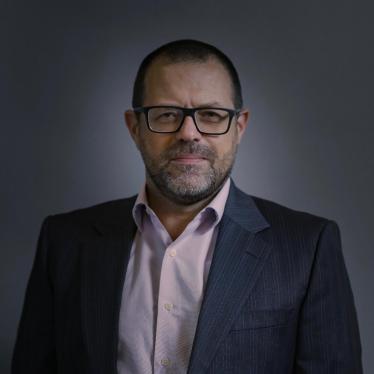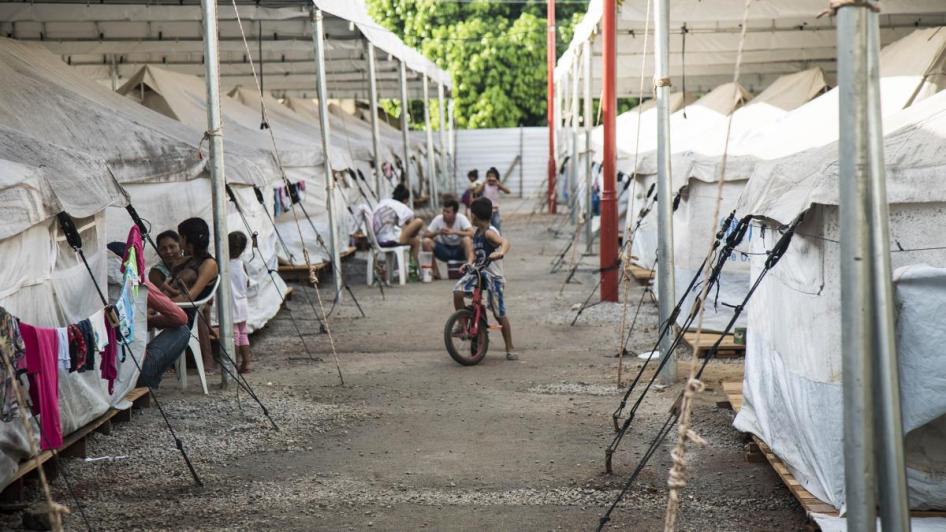Early on 18 August 2018, *Ana heard fireworks and the echo of unintelligible Portuguese on a loudspeaker. “Are they going to have a party?” she wondered. She was beside the tarpaulin under which she and her husband, *Luis, and their 11-year-old daughter, *Lucia, slept in Pacaraima, a Brazilian town of approximately 12,000 people on the Venezuelan border.
Although they lived on the street in Brazil where they had sought asylum, Ana and Luis told us they were better off than in their native Cumaná, a coastal town in Venezuela 1,200 kilometres away. In Cumaná, they had eaten so little food that Lucia had fainted several times from hunger at school. So they quietly sold all they had and walked away from their jobs at a government company. They had witnessed government agents blacklisting people for opposing President Nicolás Maduro, Ana and Luis said. They were afraid of being persecuted for leaving their jobs if they ever went back to Venezuela, but felt they had no choice.
The loudspeaker that Ana heard, three weeks after their arrival, was on a car driving slowly down the street announcing not a party but a protest. A crowd followed the car. The day before, a group of people, allegedly Venezuelans, had robbed and injured Raimundo Nonato de Oliveira, a well-known shop-owner. A false WhatsApp message circulated that an Army ambulance was reserved for Venezuelans and had refused to take him to a hospital in the state capital, Boa Vista. The loudspeaker stretched that lie, shouting that Raimundo had died of his injuries.
Mayhem ensued.
Brazilian men and women poured their anger onto the ramshackle encampments set up by Venezuelans on empty lots and sidewalks. Ana’s sister and aunt ran to warn her. “The Brazilians are going nuts. Run, run!”
Brazilians were shaking the tarps to make the Venezuelans come out, Luis said, then pouring gasoline and setting them on fire. As he gathered whatever belongings he could, Luis saw children emerging from under the tarps, coughing.
He saw a man squirt mosquito pesticide and set it on fire with a lighter, before using it to burn a young Venezuelan woman’s back. Luis and his family ran for a nearby hill, leaving behind food, clothing and Brazilian and US bills worth about 60 dollars – a fortune for them.
We heard testimony after testimony that corroborated what Luis and Ana said. For example, Marina Contreras, a 26-year-old Venezuelan indigenous woman, lost a bag of medicines, and her one-year-old daughter’s only shoes. A week later, when we talked to her, the toddler still had no shoes. Other Venezuelans lost personal identification papers, a daunting setback given the time and effort it takes to obtain them in Venezuela.
Cellphone videos show the mob shouting against Venezuelans, piling up their belongings and setting them on fire in the street, a loader tearing down a permanent stage for public shows under which Venezuelans had set up their tarps, and police standing by, doing nothing.
Pacaraima prosecutor Lincoln Zaniolo told us military and civil police were indeed present during the attack on the Venezuelans but made no arrests.
The mob pushed about 1,200 Venezuelans back across the border, Hilel Zanatta, the colonel commanding the Armed Forces at the border told us. He said some people on the Venezuela side of the border stoned cars with Brazilian plates in reprisal.
Some of the Venezuelans pushed out of Brazil may have been asylum-seekers, according to Zaniolo, the prosecutor.
Ana’s family eventually found shelter in a Baptist church in Pacaraima, along with 26 other Venezuelans, including four children separated from their parents. The children cried for hours.
At least eight more children were inadvertently separated from their parents that day, Zaniolo said. The next day, the United Nations High Commissioner for Refugees (UNHCR) took Ana’s family and the others in the church to a shelter in Boa Vista. The children were reunited with their parents, Zaniolo said.
The Pacaraima onslaught was not the first attack on Venezuelans in Brazil. In March, a mob expelled Venezuelans from a shelter in the town of Mucajaí and burnt their belongings. The attack was in reaction to the killing of a local man during a fight in a club, during which a Venezuelan also died. In July, prosecutors charged five men with hate crimes for the attack on the shelter. On September 6, a group of Brazilians lynched to death a Venezuelan whom they accused of killing a Brazilian man in Boa Vista. Police have made no arrests.
But there have also been acts of kindness elsewhere in Roraima. Desperate from hunger, Fran Morales, his wife, and five children, left Venezuela in July and set out to walk the 200 kilometres from the border to Boa Vista. Brazilian families gave them shelter and food twice along the way, and others gave them rides.
We talked to Morales in one of the 10 shelters the federal government and the UNHCR have opened in Roraima State, which today house 4,600 Venezuelans.
Many other Venezuelans sleep in packed rented rooms or on the streets in Boa Vista. More than 110,000 Venezuelans have entered Brazil through Roraima this year, and only about 30,000 have gone back, Federal Police told us. Not all of them stay in Brazil, but tens of thousands live in Roraima.
Brazil’s federal government has made a considerable effort to respond to the crisis and has kept the border open to Venezuelans, who flee hunger, lack of basic health care, and persecution. But the government has been slow in integrating them into society; so far, only about 1,100 people have been voluntarily taken to other parts of the country through a program funded by the federal government. Most children in shelters do not go to school, military personnel told us. Venezuelans have little access to Portuguese classes. Many still don’t have legal papers to stay, which undermines their ability to get a job.
The massive influx of Venezuelans is taxing the health system of Roraima, a sparsely-populated state linked to the rest of Brazil by a single road. The directors of Roraima’s two main hospitals told us they have run out of some antibiotics and other supplies due to the increased demand and have had to rely on emergency funding to cover the needs of Brazilians and Venezuelans.
The large influx of immigrants has a clear impact on a small town like Pacaraima, but Brazilians should direct their outrage at the Maduro government – not its victims. And Brazilian authorities should take decisive action against xenophobic attacks. Prosecutors should file charges against those who use violence against Venezuelans and urge the police’s internal affairs department to punish officers who fail to perform their duties.
Although Ana and Luis cried as they told us of the attack in Pacaraima, they said they would not return to Venezuela. “We are afraid of going back. They would consider us traitors,” Luis said. They should not be forced to do so.
* Ana and Luis’s names have been changed for their protection.








